Lacey Louwagie's Blog, page 3
January 6, 2020
My Writing Resolutions: 2020 Edition
It’s been a bit of a tradition for me since I was a teenager to make “writing resolutions” every year. This year, I have two.
To submit my middle-grade novel taking place during the 2008 recession to at least 10 places — presses and/or agents.To apply for at least two grants to help me cover the cost of childcare so I can get more writing time. I am interested in the Sustainable Arts Foundation grant, which is for people trying to pursue their art while also caring for children; and the diverse writers grant, which is for speculative fiction writers from marginalized groups (being a woman still counts, unfortunately, but I am also a queer writer who identifies specifically as bisexual.)
2019 was a better year for writing than 2018 — I produced something new (a short story) for the first time since my son’s birth. Here’s hoping 2020 is better still.
January 4, 2020
Interview With Author Melissa Hart
If you love books (and if you don’t, I’m not really sure what you’re doing here), you might want to check out the Luna’s Reading Corner interview I did for New Moon Girls with author Melissa Hart.
Melissa wrote Better with Books: 500 Diverse Books to Ignite Empathy and Encourage Self-Acceptance in Teens and Tweens. She is also a columnist for The Writer magazine.
I read Melissa’s book in November, and its focus on diversity was a great “prologue” to get me in the mood for my Year of Expanded Reading.
I had SO much fun flagging all the books I want to read from Melissa’s booklist, and taking out a red colored pencil to make notes in the margins of my copy.
[image error]I ran out of kitty page flags reading this book! Luckily, I got a new package from my mom in my Christmas stocking.

December 28, 2019
Next Up: My Year of Expanded Reading
About a year and a half ago, I listened to an episode of Writing Excuses called “Reading Outside the Box” in which Mary Robinette Kowal gave the following “homework” to listeners (paraphrased):
Look at your bookshelf. Determine the type of author you tend to read. Then spend a whole year reading books that don’t fit that type.
So, for example, if you’re mostly reading male authors, for a year you read female authors. If you’re mostly reading white authors, for a year you read authors of color, etc.
I didn’t have to look at my bookshelves to know that I read a lot of white women. A fair amount of white men, too. And mostly Americans.
I immediately wanted to dive into this “homework”/challenge, but I didn’t feel like I was at a place where I could commit a whole year. My son had just turned one, and I was still grappling with this whole “motherhood” thing. My reading (and thoughts) that year were still scattered. I had enough to keep track of in my life. But I knew I would return to this challenge eventually, “maybe when he’s three,” I wrote in my journal.
He is two and a half now, and I’m going to embark on this project for 2020. I’m calling it “My Year of Expanded Reading.”
During my Year of Expanded Reading, I plan to primarily read non-White and/or non-American writers. We moved last January, so when I unpacked my books, I separated out all the books I had that fit the criteria for this challenge and put them on a separate bookshelf. That will be my “go-to” bookshelf after the new year when it’s time to choose a book.
[image error]The bookshelf on the right is my “expanded reading” shelf.
The reason for doing this for a whole year is to really challenge your assumptions about how storytelling is meant to unfold. To expand your horizons. This as an important practice for anyone so that we can stretch our understanding and compassion, but for writers it’s even more crucial not to get stuck within the same old assumptions (and then unwittingly perpetuate them.)
I am both nervous and excited about this project. I hope to blog more about it here as it unfolds.
October 1, 2019
My Appearance at Books on Third
The Marshall Area Fine Arts Council (MAFAC) recently opened/rebranded Books on Third, a gift shop that sells awesome artwork, jewelry, and BOOKS by local and regional authors. I was honored to be one of the authors invited to attend the grand opening. I went through the store’s stock of my book, Rumpled, at the event and got to leave a new stack for the store’s inventory. As a stay-at-home mom who fits all my writing into nooks and crannies (mostly journaling and book reviews since those forms cope most easily with the interruptions of a toddler waking from his nap), it’s always so reaffirming to spend some time immersed in my “writing self.” Thank you, MAFAC, for granting me the opportunity to be seen as a writer first for a couple hours last week!
Photos below.
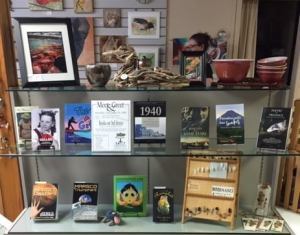
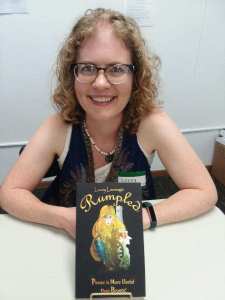
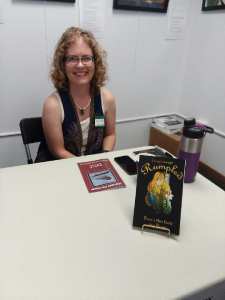
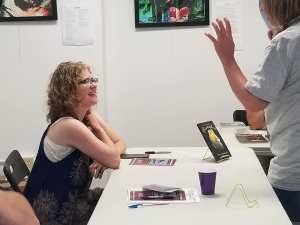
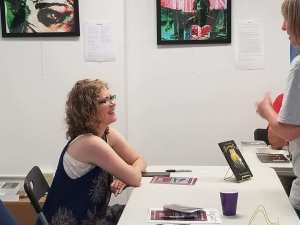
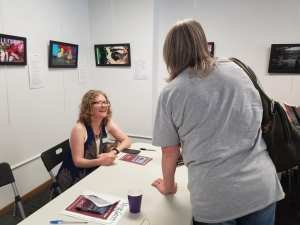
April 7, 2018
The Line Between: Eliza and Her Monsters by Francesca Zappia
 Eliza and Her Monsters by Francesca Zappia
Eliza and Her Monsters by Francesca Zappia
My rating: 5 of 5 stars
What I loved about this book was the way that it portrayed the creative process.
Zappia GETS IT when it comes to the desire to escape into an imaginary world, when it comes to that world feeling more real than the one you live in, when it comes to living two lives simultaneously, and when it comes to ignoring real life so that you can more fully submerge yourself in a fictional one.
She gets how unsettling it is when real life starts to feel more compelling than imagined life, and how scary it can be to navigate that transition, with all the inherent danger of real emotions and real consequences.
She gets how fragile an imagined world can be, and how devastating it can be when something happens to interfere with your relationship with it.
Those are the reasons I love this book, and the reasons that it spoke to me. But I also appreciated the nuanced portrayal of social anxiety and the way the characters didn’t fit into neat boxes — a jock can also write geeky fanfiction, you say? I know, I wouldn’t have believed it, either, but this book convinced me!
The writing is beautiful, the character portrayals nuanced, real, at times heartwrenching. I didn’t love everything, but I gave the book five stars because it’s one of those books that does what it does right SO right that I was willing to overlook where it fell short.
But my quibbles — I didn’t particularly love how reminiscent of deception-romantic comedy plotlines the central tension was, in terms of Eliza not being willing to reveal her identity to Wallace. And I sort of wish that books about fandom would once in a while just be about regular fans rather than THE MOST UBER OF ALL FANS AND THE MOST LAUDED OF ALL CREATORS. Here, Eliza is the famous (but anonymous) creator of a viral, beloved internet comic, similar to Cath being the pre-eminent Simon Snow fanfic author in “Fangirl.” And of course, Wallace had to be THE most famous fanfic writer in the Monstrous Sea world rather than just A fanfic writer within that fandom. There’s a bit of wish-fulfillment in YA’s propensity for always making the main character the most dramatic representation of the class being portrayed.
Also, I thought it was pretty tacky how the author used her own previous work as the iconic book series that the main character was obsessed with.
All that aside, I still loved this book, obs.
Popsugar Reading Challenge: A book I meant to read in 2017.
April 1, 2018
Wanted: A Speaker for the Dead
As my husband drove me to work the Monday after his father died, I said, “I wish we had a Speaker for the Dead for your dad.”
He said, “I was thinking the exact same thing.”
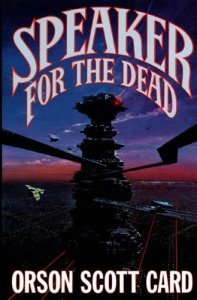 In Orson Scott Card’s novel of the same name, the second in the Ender’s saga, a Speaker for the Dead is a person whose job is to carefully, compassionately, and objectively examine the life of someone who has passed away, reconstructing an honest picture of the deceased that is shared at the funeral. The Speaker is a professional and an outsider, not someone who knew the deceased in life. The idea is that the Speaker may be able to find beauty and meaning in ways that those closest to the dead may not be able to and to find compassion even for those who may not have led exemplary lives. [As a side note, Orson Scott Card’s Speaker for the Dead would have his work cut out for him attempting to make sense of OSC’s early fiction’s messages of inclusivity and his later vitriol against the GLBT community, which is explored thoughtfully by the fine gentlemen of Overdue if you’re interested in hearing more.]
In Orson Scott Card’s novel of the same name, the second in the Ender’s saga, a Speaker for the Dead is a person whose job is to carefully, compassionately, and objectively examine the life of someone who has passed away, reconstructing an honest picture of the deceased that is shared at the funeral. The Speaker is a professional and an outsider, not someone who knew the deceased in life. The idea is that the Speaker may be able to find beauty and meaning in ways that those closest to the dead may not be able to and to find compassion even for those who may not have led exemplary lives. [As a side note, Orson Scott Card’s Speaker for the Dead would have his work cut out for him attempting to make sense of OSC’s early fiction’s messages of inclusivity and his later vitriol against the GLBT community, which is explored thoughtfully by the fine gentlemen of Overdue if you’re interested in hearing more.]
It’s been over 10 years since I read Speaker, so I’m a little fuzzy on the details, but what I do remember is that in the book Ender had to wrestle to find compassion and meaning in the life of a man that, to most of the world, looked like an abusive no-account.
As we reflected on my father-in-law’s life, collecting stories for the minister and for the obituary, I longed for someone who could make sense of a complicated life that had ended, and the complicated ripples that remained in the lives of his children, his siblings, and the others who were close to him.
Following an unspoken rule that we do not speak ill of the dead, his children shared stories and happy memories of their father’s hard work, compassion, generous nature, sense of humor, and resourcefulness. Choosing “The Good Samaritan” as the Gospel reading for the funeral, they talked about how he could never turn away anyone who needed help, often allowing people who were down on their luck to live in his home when they might have ended up on the street otherwise. After one glowing story from his daughter, his ex-wife commented, “I don’t remember your father that way, but I’m glad that you do.”
And therein lies the truth, that a single man can be so many different things to different people, and so many different things even to one person. Every beautiful story and memory told about him was true. But what was also true was the unspoken or the tactfully avoided, the vices that were no small part of the man’s life, that in fact loomed large enough to cost him his long marriage to a good woman and the mother of his children.
How nice if someone else could come in and make sense of it all.
But while our shared literary reference provided us some comfort and a shorthand language in which to communicate about my father-in-law’s life and death in the midst of a hellish, heartbreaking week, we knew that no Speaker was available to take this burden from his family’s shoulders.
At a meeting with our pastor, my husband talked openly about some of his father’s shortcomings. The pastor said diplomatically, “I won’t mention any of that.”
The beauty of a Speaker for the Dead, though, is that he WOULD have mentioned that, the good and the bad, and somehow made it all okay, all beautiful, all a piece of one rich and complex and completed life.
After the eulogy, the pastor invited those gathered to share stories about my husband’s father. Not surprisingly, a case of Midwestern shyness kept a room full of 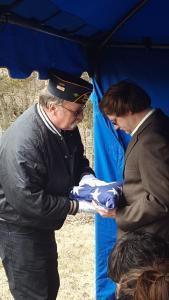 boisterous, story-rich family and friends silent.
boisterous, story-rich family and friends silent.
The pastor pressed on. “One word to describe him,” he suggested.
“Hardworking,” my husband said.
“Generous,” said someone else.
“Determined,” said another.
A smattering of complimentary adjectives and agreements followed, until his sister blurted out, “Ornery!” Amidst the knowing laughter, his daughter muttered, “Stubborn.”
The pastor said, “Ah, now the truth comes out!”
Of course, the truth was in the hearts of those gathered all along. And while no one person alone could find a way to articulate the sometimes muddled tapestry that had been the man’s life the way that a Speaker for the Dead might have done, a room full of those who loved and knew him best turned out to be pretty adequate Speakers after all.
December 11, 2017
Finding My Writer’s Identity Post-Baby
Last week, I had my writers group meeting in Arizona.
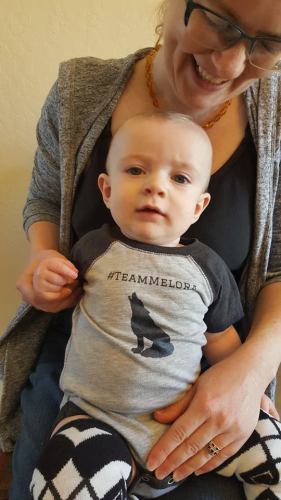
I made custom shirts for my son that were related to the stories my writers’ group members had written. Here, he sports his #TeamMelora onesie, which refers to the love triangle in Marie Zhuikov’s books, “Eye of the Wolf” and “Plover Landing.”
This may not seem unusual, unless you know that two members of my writers group live in Minnesota and that I live in South Dakota. The fourth member retired to Arizona, and we’ve always talked about having one of our meetings on his turf. I founded the group when all of us were living in northern Minnesota, but we’ve been meeting via Skype since about 2010-ish, after I moved away.
I brought my four-month-old on the trip. It was my first time attempting a vacation or “big travel” of any kind with him.
There was this strange disconnect, having my son with me, because I wanted my primary identity on the trip to be “writer,” but instead I felt like it was “mother.” I
was acutely aware of how my attention was almost constantly claimed by the emotional and practical logistics of traveling with a baby — will I be able to find a place to sit down and nurse him, is he getting enough naps amidst all this excitement and running around, when was he last changed, do we have enough wipes to make it through the rest of the week, will he sleep well enough for me to feel rested for tomorrow’s big excursion, will this rough mountain road give him shaken baby syndrome (yes, really!), do I need to pump a bottle for later, etc. and etc.
Perhaps I was also too acutely aware of the changed perceptions my writer friends might have of me. Did they think I was a good mom? Did they have faith that my writing would be back on track again soon? While the group has always known me as its founder and “Lacey of the Vorpal Blade*”, now am I just Lacey the Mom?
I realized when I was reflecting upon this in my journal today** that my writers group may be more important to me now than it has ever been. I formed it 15 years ago because I had just moved to a new city and was drowning in loneliness, desperate for anything that might help me make some kind of regular connection with other human beings. This loneliness, and a lack of anyone around who could reflect back to me my understanding of myself, meant I was caught in a similar kind of identity crisis as I am now. The group gave me a place to belong and to affirm my identity as a writer all those years ago — and now when I feel myself afraid of becoming subsumed by my role as a mother, they are still there, capable of reminding me that I am still a writer, ready to pull me through this next transition and help me believe that I still have words waiting inside.
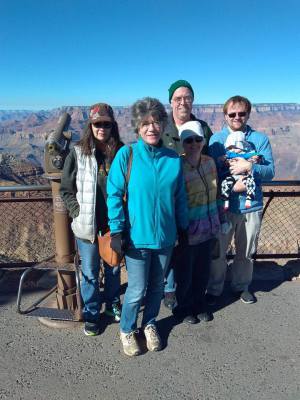
My writers group at the Grand Canyon, with my husband and son tagging along on the right. (My husband was not much mentioned in this post, but I NEVER could have even dreamed of doing this trip without him.)
In the years that we have been together, we have read thousands of words of each others’ stories — but we have also witnessed each others’ life stories unfold. When I started the group, I was single and living alone. Now I am married with a baby and have lived in two cities besides the one where I started the group. My career has shifted half a dozen times. Two members who were working full-time when the group started are retired. One who was married is divorced, and we have seen her son, who came to a meeting once when he was seven, graduate high school. Collectively, we’ve said goodbye to parents, friends, and pets. And of course, there have been the publishing and submission successes and failures that go along with so many years living the writing life.
Because I burned up all my vacation time during my maternity leave, and because my job is part-time and can be done remotely, I did not take much time off work for the trip. So each day, coordinating my work and wrangling my baby ate up so much mental space that I wondered if I should have boarded that plane and spent that money — more a concern than ever now that I’m working less and our income has dropped. It’s only after being back home and allowing the experience to really filter through me that I realize the time away did in fact do exactly what vacations are meant to do — work and my son may have kept me from checking out every site and exploring every town, but the trip still gave me a new perspective on my life, and a dose of inspiration for going forward.
*The ‘vorpal blade’ is from Lewis Carroll’s poem, The Jabberwok, in which “The vorpal blade went snicker-snack!”, and is used here as a joke about my reputation for being (brutal? ruthless?) with my critiques. I’m not sure the reputation is totally earned/justified, but that’s probably a blog post for another time. 
November 19, 2017
Rumpled Book Talk
A few weeks ago, I traveled back to my hometown to give a talk about my Rumpelstiltskin retelling, Rumpled, as part of the Marshall Area Fine Arts Council (MAFAC’s) read local series, which hosts book discussions with local authors. A recording of the talk is below.
In the talk, I discuss the origins of the story in an ongoing “firstborn child” joke I had with my friends in college, as well as my interest in the idea that we assign morality and other character traits based on someone’s physical appearance alone.
Some of the images I used in the talk can be found here, courtesy of the SurLaLune Fairy Tales repository (an awesome resource for anyone who loves fairy tales.)
Creepy ‘Pilgrim-looking’ Rumpelstiltskin
Lizard-like Rumpelstiltskin
‘Dopey’ Rumpelstiltskin
Balding Rumpelstiltskin
Pot-bellied Rumpelstiltskin
I also referenced the Shrek franchise’s depiction of Rumpelstiltskin, as well as the books Rumpelstiltskin by Paul O. Zelinsky, Rumpelstiltskin Returns, Fairy Tale Comics: Classic Tales Told by Extraordinary Cartoonists, and Rumpelstiltskin by Paul Galdone.
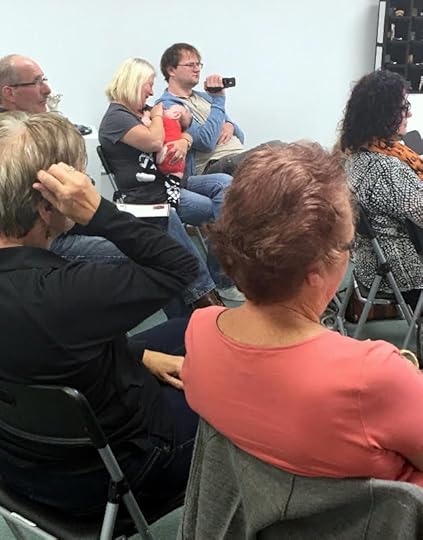
An “audience shot,” which includes my husband taking the video and my aunt holding my firstborn child.
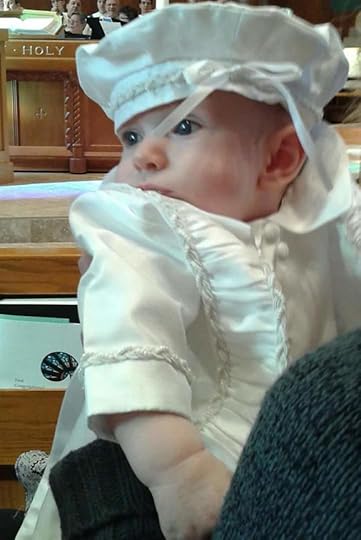
And firstborn child visual aid.
October 27, 2017
Fairy Tale Book Review: Once Upon a Dream by Liz Braswell
 Once Upon a Dream by Liz Braswell
Once Upon a Dream by Liz Braswell
My rating: 3 of 5 stars
This book was similar in quality to “A Whole New World,” but because I don’t have the same abiding affection for Sleeping Beauty, it did not get the same (perhaps unwarranted) rating inflation.
It reminds me a bit of “Sleeping Beauty” meets “Alice in Wonderland.” Most of the story takes place in a dream world which gets pretty dark in places, which is sort of this series’ “shtick.” I was impressed by how well Braswell fleshed out the various characters from Disney’s Sleeping Beauty, considering most of them are pretty flat in the original. I could really “picture” her versions of Prince Phillip, Maleficent, King Hubert, Maleficent’s minions, the good fairies, etc. The one place where it fell a little short was her characterization of Aurora (or Aurora Rose, as she calls herself, to encompass both her identities). It was hard for me to picture the Aurora from the movie doing and saying all the things she does in this book because she really is such a “blank slate” as a Disney princess, virtually without personality, so the character in this book feels like someone new I had to get to know as a reader rather than a new take on someone I already loved. This was somewhat jarring, since she is the central character. However, I really liked the way that Braswell interpreted even this “lack of personality” so that it made sense in Aurora’s circumstances, and especially her reasons for touching the spinning wheel, adding a depth to the original character that was never there before and casting her in a whole new light.
The book is also a bit meta in that it uses the dream setting as an opportunity to critique the original tenets of the Sleeping Beauty story (love at first sight, a curse laid upon a baby, etc.) At times the story did get a little tedious, but it was still an interesting enough “take” that I’ll continue to explore this series.
October 17, 2017
Fairy Tale Book Review: Confessions of an Ugly Stepsister by Gregory Maguire
 Confessions of an Ugly Stepsister by Gregory Maguire
Confessions of an Ugly Stepsister by Gregory Maguire
My rating: 4 of 5 stars
This is one of the best Maguire books I’ve read, right up there with the first couple Oz retellings (I only read the first two but heard the later ones weren’t as good.)
Similar to “Mirror, Mirror,” Maguire places the story of Cinderella within a firm historical time and place — Holland at the start of the tulip trade. But unlike “Mirror, Mirror,” it doesn’t have the strange conflagration of fantasy and historical realism that didn’t quite work for me. “Confessions” could be read as a straight historical retelling with the characters holding onto some “magical” belief systems, or it could be read as a very subtle fantasy rooted in a historical setting. This ambiguity worked for me.
The stepmother and stepsisters, as well as the “Cinderella” character, are all vividly drawn. The stepmother comes across as both wicked and sympathetic — surely not an easy feat to accomplish. As soon as I got over my hangup that it felt as if this story should be told first-person (it’s CONFESSIONS, after all!), I enjoyed the masterful and detailed writing — although the level of detail and the change the characters underwent in the course of the story made it feel as though it should have taken place over a longer span of time than it actually did. Still, that was a minor quibble — and the minor “twist” at the end really worked for me.
The retelling genre teems with Cinderella stories, but this one moves to the front of the line for me.



